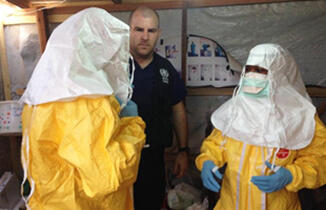
“Today’s discharge of patients shows that Ebola is not always fatal. Good, early supportive care such as hydration, nutrition and appropriate medication can have a positive impact” says Dr Tom Fletcher, Infectious Diseases physician at WHO and LSTM Alumni and Research Fellow.
Dr Fletcher is currently seconded from LSTM and the Defence Medical Services to the clinical team in the Dept. of Pandemic and Epidemic diseases at WHO HQ, Geneva. He has been working on filovirus (Ebola, Marburg) case management and research protocols and was part of the lead team from WHO deployed to support the WHO country office and Ministry of Health in Guinea for the current Ebola Viral disease outbreak.
“I have been here for 2 weeks mainly focussing on providing clinical care in isolation facilities and also undertaking a clinical and IP&C needs assessment for Ebola in the capital Conakry. Our dept. within WHO advocates equity of access to life saving interventions for all, and this is especially difficult when managing a dangerous disease that frequently kills healthcare workers. I have been mentoring and working with local ID physicians in Conakry, partnered with Medicins Sans Frontieres, and supported by rapid molecular diagnosis by a deployed Institute Pasteur laboratory from Dakar.
“The main difficulties in providing care include wearing protective equipment in heat above 30 degrees; the resource limited environment and lack of normal laboratory monitoring. One must make safety of health care workers a priority and respect the pathogen, but it is clear to me that what these patients need is good clinical infectious disease care, that I have learnt through training at LSTM and the Royal Liverpool University Hospital’s Tropical Infectious Diseases Unit.”